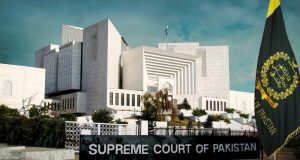The NAB has sent the Supreme Court a detailed report on 905 cases.
On October 18th, the apex court requested this record from the anti-corruption body.

ISLAMABAD: The National Accountability Bureau (NAB) has handed over the details of 905 cases in which convictions were awarded by the trial courts and upheld by the superior judiciary. In each of these cases, the convictions were upheld by the superior judiciary.
The anti-graft body was acting in accordance with the order handed down by the Supreme Court on October 18th.
“NAB shall provide to the court the record of the outcome of different references filed by it since the year 1999 and the number of convictions that have been recorded therein by the trial courts and the number thereof that have been upheld by the higher courts,” read the order that was issued on October 18. The order was issued by a three-judge special bench of the apex court led by the Chief Justice of Pakistan Umar Ata Bandial while hearing PTI chairman and deposed premier Imran Khan’s petition against t
The National Audit Bureau made public in its report the titles of the references, the names of the accused persons, the dates on which they were convicted, and the status of the punishments in both the high courts and the Supreme Court.
In addition, the report stated that all of the necessary information had been gathered from the NAB regions.
The National Accountability Bureau (NAB) report detailed the cases that took place in the Balochistan region and stated that convictions were handed down in 171 of those cases, of which 142 were upheld by the Balochistan High Court.
A plea bargain was accepted in ten of the cases, an appeal was not submitted in an equal number of the references, and one of the convicted individuals passed away.
Twenty-one cases coming from the province were heard and decided by the Supreme Court; five of them were allowed, 12 of them were dismissed, and leave was granted in two of them.
The Supreme Court of Pakistan has informed ILO that their rules will not apply in Pakistan.
The trial courts in the Karachi region handed down convictions in 87 out of the 100 cases they heard. The Sindh High Court upheld 78 of the accused, while the remaining eight were found not guilty.
Nevertheless, two of the cases were closed, and one of the cases allowed for an appeal. There were ten cases from the city that were still being considered by the Supreme Court.
Convictions were handed down by the trial court in 61 of the cases that were heard in the Khyber-Pakhtunkhwa region. The appeals in 60 of those cases were still being heard by the Peshawar High Court, while the sentence of one convict had already been carried out.
In the Supreme Court, three cases originating in K-P were closed, four appeals were accepted, ten cases were thrown out, and six cases were still active.
There were 314 cases in the Islamabad/Rawalpindi region that resulted in the trial court handing down a conviction for the accused party. In the highest courts in both cities, the convictions were upheld in 101 of the cases, while the accused were found not guilty in 105 of the cases.
There were a total of 58 cases that were still pending when a plea bargain was reached in four of them, the accused gave up in 19 of them, and there was no appeal filed in 22 of them.
There were a total of 221 cases that took place in the Lahore region, and the trial court reached a verdict of conviction in 215 of them.
In 96 of the cases that were brought before the Lahore High Court, no appeal was lodged, a plea bargain was reached in 10, the convictions were upheld in 80 of the cases, and appeals were permitted in 10 of the cases.
At the Supreme Court, appeals were rejected in 10 of the 11 cases that came from Lahore, while the remaining case is still being considered.
The trial courts in the Sukkur region handed down convictions in 49 cases, and plea bargains were reached in 38 of those cases. In nine of the cases, appeals were not submitted.










































